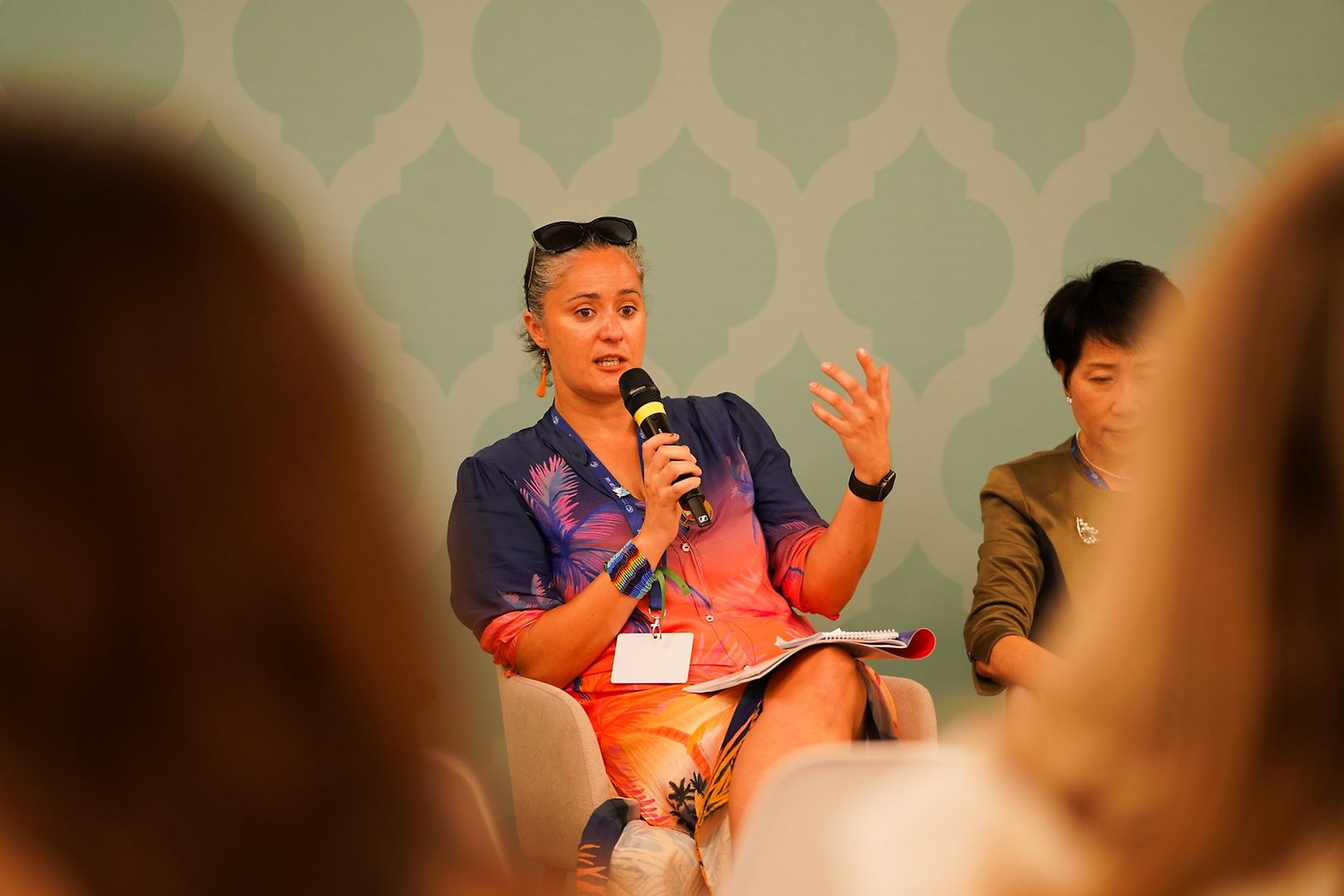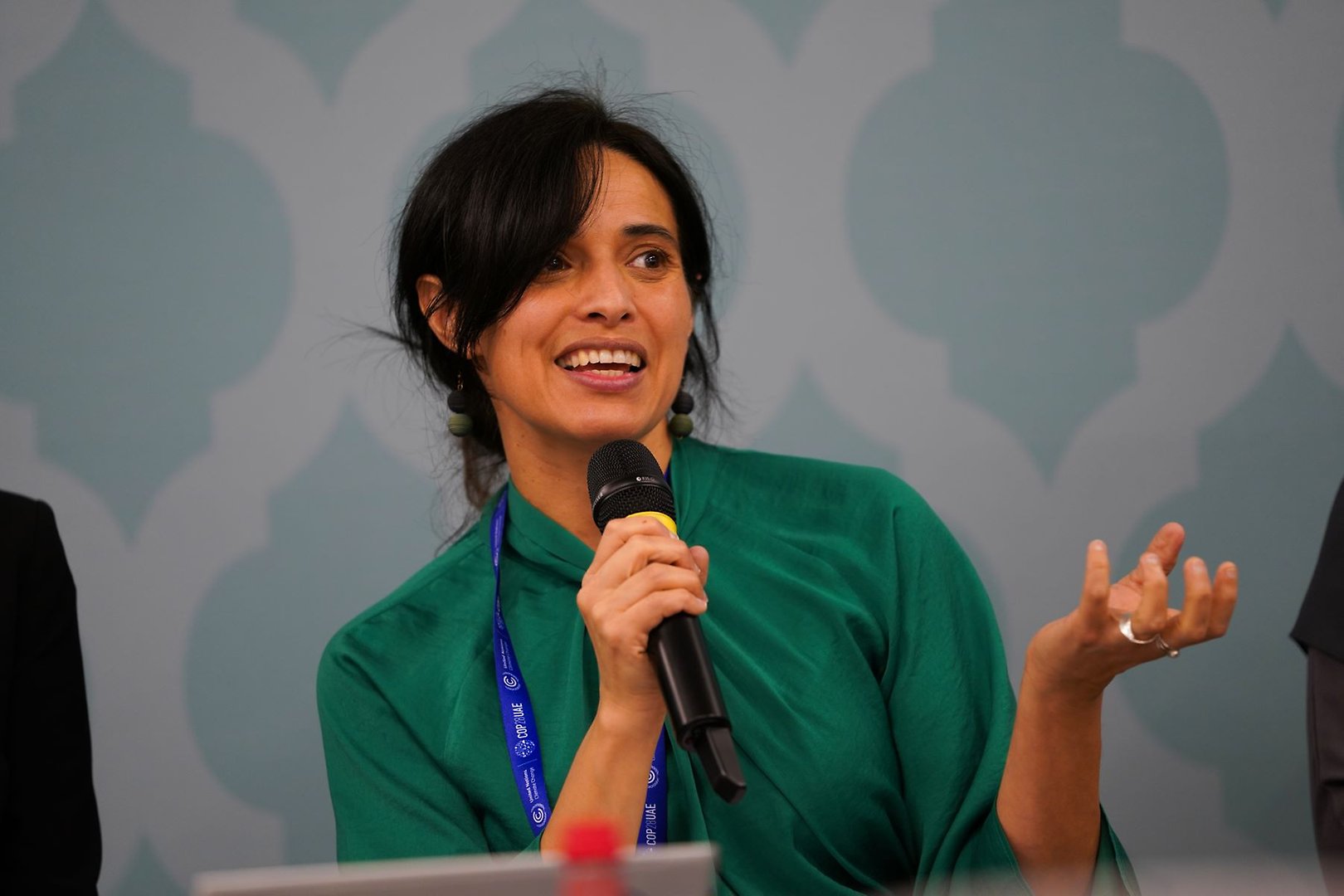Climate conference COP28
COP28: Promising shifts, but a lot remains unsolved

Centre researchers Laura Pereira and Cibele Queiroz reflect on the outcome of COP28. Photo collage by Stockholm Resilience Centre. Background photo by COP28/Christopher Pike.
A deal referred to as historic was made to conclude COP28. Centre researchers recognise that important progress was made, but warn about thinking new technology can solve challenges ahead
- Despite positive signs, COP28 outcomes leave space for loopholes and lack a clear plan for how ambition will turn into reality
- Important progress was made at COP28, not least regarding food systems
- There are positive shifts in a vast majority of countries agreeing that we need to phase out fossil fuels
After 14 days of negotiations, nearly 200 countries agreed to transition away from fossil fuels to avert the worst effects of climate change. The language in the final text of COP28 demonstrates that many states and interests are not willing to shift out of oil and gas yet. Centre researcher Laura Pereira, on the other hand, says that there´s now momentum for real progress.
“Whilst the agreed texts are not the ambitious versions that they could have been, there have been positive shifts in a vast majority of countries agreeing that we need to phase out fossil fuels and that there are some theme-based adaptation targets,” says Laura Pereira, who participated in a range of panels and report launches during the meeting.
She also welcomes that the Kunming-Montreal Global Biodiversity Framework was referenced in the final text, linking climate and biodiversity. She further underlines the importance of the established loss and damage fund, adding that money still needs to go to adaptation to prevent loss and damage in the first instance.
There have been positive shifts in a vast majority of countries agreeing that we need to phase out fossil fuels.
Centre researcher Laura Pereira
The most powerful aspect of the COP was however the intersectional force of civil society coming together to defend the 1.5 degree target, she says.
“They held the line in the face of fossil fuel interests, both throughout the meeting and especially in the final 48 hours,” says Laura Pereira.
She also says that the science community has a lesson to learn in explaining carbon capture and storage (CCS), and carbon dioxide removal (CRD) — technology solutions put forward as essential in the transition away from fossil fuels.
“We need to do a better job emphasising the uncertainties in these tech interventions of CCS and CRD as solutions, instead of fossil fuel phaseout," says Laura Pereira.

Centre researcher Laura Pereira at COP28. Photo: Holly Hayes/The Resilience Hub.
Loopholes and risks
Centre researcher Cibele Queiroz, who is also Head of Knowledge at the Global Resilience Partnership, sees also risks with the language of the deal:
“Despite positive signs, it is important to say that COP28 outcomes leave space for loopholes and lack a clear plan for how ambition will turn into reality."
Another risk with the agreement is the emphasis on transition fuels with lower carbon emissions, such as fossil gas, to bridge the energy transition into renewable energy.
“Transition fuels can play an important role, in particular in countries from the Global South that have a high dependency on coal and oil. However, there is a risk that investments that should be directed to renewable energy get directed to transition fuels instead, fostering the same type of infrastructures that support the production of other fossil fuels with higher emissions, reinforcing the status quo”.
Despite positive signs, it is important to say that COP28 outcomes leave space for loopholes and lack a clear plan for how ambition will turn into reality.
Centre researcher Cibele Queiroz
Cibele Queiroz also points out a third risk: the large implementation gap between the current nationally determined contributions and the actual climate policies implemented. Vulnerable countries have not yet received the promised pledges on climate finance that would allow them to achieve their nationally determined targets for the current period (2020-2025).
“With the need for stepping up emission reductions even further, what becomes evident is the urgent need for increasing climate funding, as well as mechanisms that make climate finance reach the places and communities where it is needed, if we are to meet a rapid and just transition,” says Cibele Queiroz.
The finance gap is large and predicted to increase if current trends continue. Yearly pledges for adaptation funds will need to double during this decade to be able to fulfil the needs of the most vulnerable countries.
“Even if climate finance substantially increases, it is important to say that finance does not per se lead to the type of transformative change that is needed. Research can play a key role here, on advancing knowledge that contributes to a better understanding of leverage points for financing and enabling transformation across different sectors and regions,” says Cibele Queiroz.

Centre researcher Cibele Queiroz at a session at the Resilience Hub. Photo: Holly Hayes/The Resilience Hub.
Progress on food
Cibele Queiroz also highlights that important progress was made at COP28, not least in regard to food systems.
For the agriculture day during the meeting, the COP28 presidency organised a ministerial dialogue on building food and water resilience to launch a two-year partnership hosted by the UNFCCC’s Climate-Resilient Food Systems Alliance. This will support countries and non-state actors to better integrate water and food systems management – for both adaptation and mitigation – in national climate plans ahead of COP30.
I was positively surprised to hear interventions that recognised environmental impacts of food imports.
Centre researcher Cibele Queiroz
“I think this initiative is a very important step for putting food and water systems resilience at the heart of the COP agenda. It marks the increased recognition of the critical role of food and water systems for achieving climate mitigation and adaptation goals,” says Cibele Queiroz and continues:
“I was pleased to see some promising commitments to integrate sustainable food and water systems in national climate strategies. I was also positively surprised to hear interventions that recognised environmental impacts of food imports.”
However, she also says that she is worried that many ministerial interventions still overemphasise the use of technology and drought-resistant seeds as silver-bullet solutions for climate resilience in food systems.
“An overlying issue in such solutions is that they reinforce the status quo of a system that needs true transformative change. Issues of justice and distribution of food access were also hardly mentioned, despite us knowing that these are at the very core of resilience and food and water security.”
She says that a rapid shift of the dominant narrative on what resilient and sustainable food and water systems actually are is needed.
“We need to acknowledge that food and water systems resilience is intrinsically social-ecological and that includes a diversity of perspectives, values and cultures based on principles of equity and justice.”








